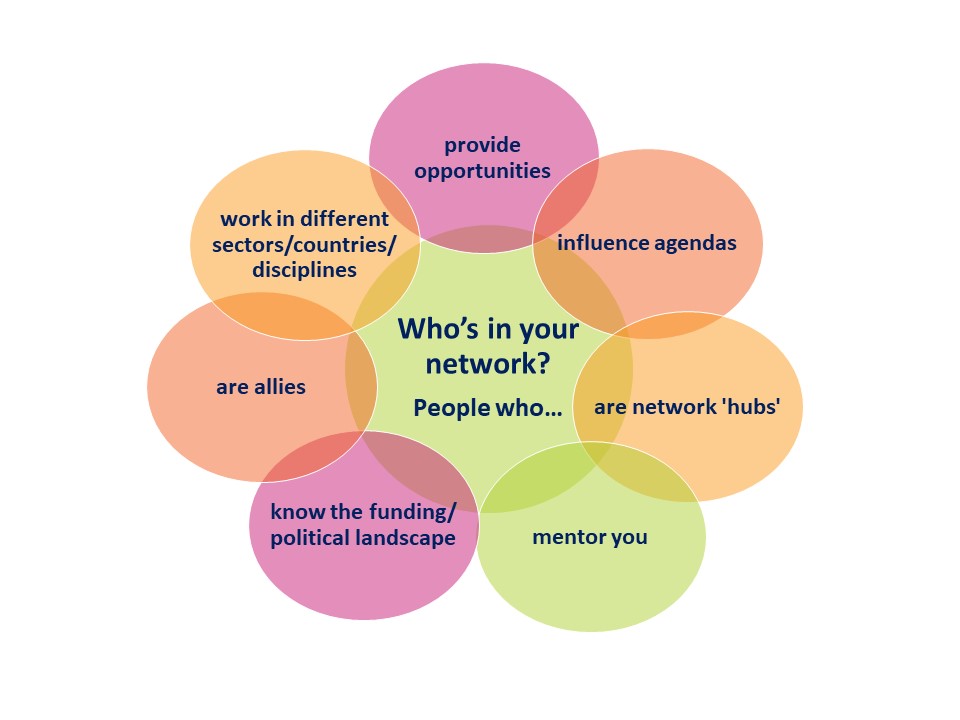How healthy is your network?
A good project manager periodically reviews their stakeholder map and management plan. This keeps everyone with influence or interest engaged and contributing to the success of a project. It gives an opportunity to identify new stakeholders that have emerged since the project initiated. Obviously, you are not a project, but your career and research strategy will benefit from this approach. It is good practice in managing yourself and your career to periodically review the health of your networks.
Do you have a healthy and strategic network? Are you making the most of your networks, and are they getting the most from you?
Who should be in a research leaders’ network?

People who:
- ...provide opportunities
- ...are network ‘hubs’
- ...know the funding or political landscape
- ...offer you a different perspective
- ...have influence
- ...can mentor you
- ...are allies
It’s important to have people in your network who can provide you with opportunities that can develop you or add to your CV. They might be people who are more senior to you, who are looking to delegate opportunities from which they no longer get value or have time for. The opportunities may help you in your career goals – for example, to join a collaboration, be on a review panel or committee, or do some outreach activities.
Put simply, these are people who know lots of other people. They might be members of professional services in the College who can quickly connect you to many other people, or they might be based at funding bodies or learned societies – these people always know someone to connect you with, who can help you with any queries or requests you have that are outside your knowledge area.
This might be people who sit on a funding panel, or on a university research committee – these are people who have a broader and perhaps longer-term view of the landscape than you. They can forewarn you of opportunities and challenges on the horizon and help you to be more strategic.
This might be because they work in a different sector, country, or discipline area. These people can help you to think of the most impactful research questions, to view yourself and your research from different perspectives and offer you new avenues and ideas. Often the most exciting research comes from the interface of different sectors and disciplines, so working with these people could really increase your motivation levels, as well as your ability to tackle complex challenges.
These might be people in your department who have influence on administrative processes or teaching loads or might be on policy committees or in lobby groups – they can help you with lobbying for change and understanding how to have more influence yourself.
Someone you can speak with either formally (with regular meetings) or informally in an ad-hoc way when you have something to discuss. A mentor is someone who can reflect on their experiences and share the insights they have gained. They can act as a sounding board, or help you to process difficult situations, to help you to think more strategically, and connect you to other people to add to your network.
Possibly one of the most important groups, your allies are people that feel the same as you and have similar opinions and needs as you. They will truly empathise with your challenges and victories. You can act as united force together or offer a shoulder to cry on. These are the people you can relax with, let off some steam and know you are not alone.
Review the health of your current network
You might have many people in your networks; however you can also review how strong and up to date your relationships are. To review your network strength, download our Reviewing your network worksheet (doc). You could also suggest that members of your team do the same – do they gave gaps that you can help them to address?
Are you ‘Collaboration Ready’?
Are you doing the things that will naturally build networks and attract potential collaborators? Take a few minutes to download and reflect on the prompts in our Checklist: Are you collaboration ready? (doc).
Previous and next
Go back to the previous section: Reviewing your networks and visibility overview
Go to the next section: Building visibility and reputation